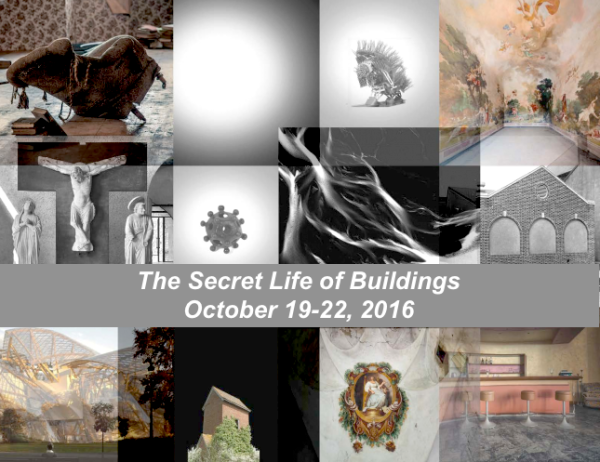Symposium: The Secret Life of Buildings

Architecture is a heady business. Not only must architects be artists, expressing the tenor of the times; they must have a thorough understanding of engineering and materials, creating structures that are beautiful and sustainable under strict economic constraints. The field is ever-changing, ever pointed towards the future.
On October 19 -22, the School of Architecture will host a symposium titled The Secret Life of Buildings. Organized by the school’s Center for American Architecture and Design, the conference will explore Speculative Realism and Object Oriented Ontology (OOO)—an emerging philosophy that imagines that buildings and the things in and around them not only promote human life, but also have lives of their own, separate from our experience of them. The symposium will also consider other similar theories that investigate whether or not (and how) inanimate structures affect their surroundings and the world at large.
OOO challenges the idea that all that matters about a building is the experiences it provides human beings. Like all objects, buildings operate in many other dimensions of reality, in part in how they relate to each other and their non-living components and inhabitants, and in part because they simply are, and do, so much more than can appear to us. Things go on in closets, ducts, walls, pipes, and locked rooms; in areas out of common sight, late at night, and so on. Other things go on with chemical changes in materials, with expansions/contractions, and structure-borne sounds, and the hosting of other species. In short, a building’s silence far exceeds its eloquence. It lives its own life. What happens within a building when we are not there? How does a building relate to the objects within it? How does it relate to other buildings around it? Do ‘objects’ and ‘relations’ make space for architecture? These are just a few of the questions that OOO seeks to answer.
Creative designers adopt, refine, transform, and use things and ideas from outside their discipline to spark innovation and creativity. Thoughtful architects constantly question the received wisdom of their peers and colleagues as to what buildings are supposed to do or are able to do. OOO represents the first movement in philosophy since the 1980s and 90s that has the potential to catalyze new approaches within the field. Presenting a radically new way for architects to think about the world and design, OOO challenges creators of the built environment to consider the potential of their structures beyond design and fabrication. Rather than view buildings as discrete and inanimate, architects may consider them as organic creations that affect their surroundings in ways seen and unseen.
The Secret Life of Buildings is the first gathering of leaders of this exciting new realm of critical thought. Presenters will include philosopher Graham Harman of the American University in Cairo and Sci-Arc, and founder of Object Oriented Ontology; architect and theorist Albena Yaneva of the University of Manchester; architect and theorist Jorge Otero-Pailos of Columbia University; and our own architect and theorist Michael Benedikt, among other prominent thinkers and practitioners such as Levi Bryant, Timothy Morton, Craig Dykers, Winka Dubbeldam, Ian Bogost, Leslie Van Duzer, Matthew Crawford, and UT faculty co-organizer Kory Bieg.
The symposium will be accompanied by an exhibition, Objects. Comprised of the top fifteen entries of an international design competition, the presentation will feature works that examine the ideas of Object Oriented Ontology and Speculative Realism through the design of real, tangible things: objects.
Click here for a detailed schedule and event information.
